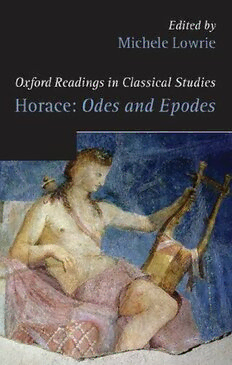Table Of ContentOXFORD READINGS IN CLASSICAL STUDIES
The series provides students and scholars with a representative
selection of the best and most inXuential articles on a particular
author, work, or subject. No single school or style of approach is
privileged: the aim is to oVer a broad overview of scholarship, to
cover awide varietyof topics, and to illustrate a diversityof critical
methods.Thecollectionsareparticularlyvaluablefortheirinclusion
ofmanyimportantessayswhicharenormallydiYculttoobtainand
for the Wrst-ever translations of some of the pieces. Many articles
arethoroughlyrevisedandupdatedbytheirauthorsorareprovided
with addenda taking account of recent work. Eachvolume includes
anauthoritativeandwide-rangingintroductionbytheeditorsurvey-
ing the scholarly tradition and considering alternative approaches.
This pulls the individual articles together, setting all the pieces
included in their historical and cultural contexts and exploring sig-
niWcantconnectionsbetweenthemfromtheperspectiveofcontem-
porary scholarship. All foreign languages (including Greek and
Latin) are translated to make the texts easily accessible to those
withoutdetailedlinguisticknowledge.
OXFORDREADINGSINCLASSICALSTUDIES
Aeschylus
EditedbyMichaelLloyd
Ovid
EditedbyPeterE.Knox
TheAtticOrators
EditedbyEdwinCarawan
Lucretius
EditedbyMonicaR.Gale
Catullus
EditedbyJuliaHaigGaisser
Seneca
EditedbyJohnG.Fitch
Vergil’sEclogues
EditedbyKatharinaVolk
Vergil’sGeorgics
EditedbyKatharinaVolk
Homer’sOdyssey
EditedbyLilliamE.Doherty
PersiusandJuvenal
EditedbyMariaPlaza
Livy
EditedbyJaneD.ChaplinandChristinaS.Kraus
Horace:SatiresandEpistles
EditedbyKirkFreudenburg
Thucydides
EditedbyJeffreyS.Rusten
Allavailableinpaperback
Oxford Readings in Classical Studies
Horace: Odes and
Epodes
Edited by
`
MICHELE LOWRIE
1
3
GreatClarendonStreet,Oxfordox26dp
OxfordUniversityPressisadepartmentoftheUniversityofOxford.
ItfurtherstheUniversity’sobjectiveofexcellenceinresearch,scholarship,
andeducationbypublishingworldwidein
Oxford NewYork
Auckland CapeTown DaresSalaam HongKong Karachi
KualaLumpur Madrid Melbourne MexicoCity Nairobi
NewDelhi Shanghai Taipei Toronto
WithoYcesin
Argentina Austria Brazil Chile CzechRepublic France Greece
Guatemala Hungary Italy Japan Poland Portugal Singapore
SouthKorea Switzerland Thailand Turkey Ukraine Vietnam
OxfordisaregisteredtrademarkofOxfordUniversityPress
intheUKandincertainothercountries
PublishedintheUnitedStates
byOxfordUniversityPressInc.,NewYork
#OxfordUniversityPress2009
Themoralrightsoftheauthorhavebeenasserted
DatabaserightOxfordUniversityPress(maker)
Firstpublished2009
Allrightsreserved.Nopartofthispublicationmaybereproduced,
storedinaretrievalsystem,ortransmitted,inanyformorbyanymeans,
withoutthepriorpermissioninwritingofOxfordUniversityPress,
orasexpresslypermittedbylaw,orundertermsagreedwiththeappropriate
reprographicsrightsorganization.Enquiriesconcerningreproduction
outsidethescopeoftheaboveshouldbesenttotheRightsDepartment,
OxfordUniversityPress,attheaddressabove
Youmustnotcirculatethisbookinanyotherbindingorcover
andyoumustimposethesameconditiononanyacquirer
BritishLibraryCataloguinginPublicationData
Dataavailable
LibraryofCongressCataloginginPublicationData
Dataavailable
TypesetbySPIPublisherServices,Pondicherry,India
PrintedinGreatBritain
onacid-freepaperby
CPIAntonyRowe,Chippenham,Wiltshire
ISBN 978–0–19–920769–5(Hbk.)
978–0–19–920770–1(Pbk.)
1 3 5 7 9 10 8 6 4 2
Acknowledgements
All the essays in this collection (apart from the Introduction) have
been previously published elsewhere, as listed at the end of the
volume. The editor and Oxford University Press are grateful to the
publishersoftherelevantjournalsandbooksfortheirpermissionto
reprint. The translations from French, German, and Italian are col-
laborative efforts by Maya Jessica Alapin, Ada Bronowski, Leofranc
Holford-Strevens, Miche`le Lowrie, Alexandre G. Mitchell, Barbara
NatalieNagel,andtheoriginalauthors.Iamparticularlygratefulto
LeofrancHolford-Strevens,whosuppliedreferencestomuchancient
andmodernliteratureintheHeinze.Theseareindicatedinbrackets.
Translations of Latin and Greek have been added by the authors,
exceptforthedeceasedornon-nativespeakersofEnglish,wherethey
are by M. Lowrie. Special thanks go to Danielle La Londe, who
scanned and reformatted the articles, produced the consolidated
bibliography, and has been a model assistant. The articles are listed
inchronologicalorder.
Permissiontoreprintthefollowingarticlesisgratefullyacknowledged.
RichardHeinze,‘TheHoratianOde’,translatedfrom‘DieHorazischeOde’,
NeueJahrbu¨cher51(1923),153–68.
Steele Commager, ‘The Function of Wine in Horace’s Odes’, Transactions
andProceedingsoftheAmericanPhilologicalAssociation,88(1957),68–80.
H. J. Mette, ‘‘‘Slender Genre’’ and ‘‘Slender Table’’ in Horace’, translated
from‘‘‘genustenue’’und‘‘mensatenuis’’beiHoraz’,MuseumHelveticum,
18(1961),136–9.
P.H.Schrijvers,‘HowtoEndanOde?’,translatedfrom‘Commentterminer
uneode?’,Mnemosyne,26(1973),140–59.
MarioCitroni,‘OccasionandLevelsofAddressinHoratianLyric’,translated
from‘OccasioneepianididestinazionenellaliricadiOrazio’,Materialie
discussionidellaculturaclassica,10–11(1983),133–214.
Matthew Santirocco, ‘The Maecenas Odes’, Transactions andProceedings of
theAmericanPhilologicalAssociation,114(1984),241–53.
vi Acknowledgements
Peter L. Schmidt, ‘Horace’s Century Poem—A Processional Song?’, trans-
lated from ‘Horaz’ Sa¨kulargedicht—ein Prozessionslied?’, Der Altspra-
chlicheUnterricht,28.4(1985),42–53.
William Fitzgerald, ‘Power and Impotence in Horace’s Epodes’, Ramus 17
(1988),176–91.
Ellen Oliensis, ‘Canidia, Canicula, and the Decorum of Horace’s Epodes’,
Arethusa,24(1991),107–38.
MichaelC.J.Putnam,‘TheLanguagesofHoraceOdes1.24’,CJ88(1992),
123–35.
DenisFeeney,‘HoraceandtheGreekLyricPoets’,inN.Rudd(ed.),Horace
2000:ACelebration,EssaysfortheBimillennium(London,1993),41–63.
Alessandro Barchiesi, ‘Final DiYculties in the Career of an Iambic Poet:
Epode 17’, translated from ‘Ultime diYcolta` nella carriera di un poeta
giambico: L’epodo XVII’, in Atti dei convegni di Venosa, Napoli, Roma,
novembre1993(Venosa,1994),205–220.
DonFowler,‘HoraceandtheAesthetics ofPolitics’,inS.J.Harrison(ed.),
HomagetoHorace:ABimillenaryCelebration(Oxford,1995),248–66.
I.M.LeM.DuQuesnay,‘Horace,Odes4.5:ProRedituImperatorisCaesari
DiviFiliiAugusti’,inS.J.Harrison(ed.),HomagetoHorace:ABimillenary
Celebration(Oxford,1995),128–87.
Miche`leLowrie,‘AParadeofLyricPredecessors:HoraceC.1.12–18’,Phoe-
nix,49(1995),33–49.
LuigiRossi,‘Horace,aGreekLyristwithoutMusic’,translatedfrom‘Orazio,
un lirico greco senza musica’, Seminari Romani di cultura greca, 1 (Uni-
versita` diRoma,1998),163–81.
R.G.M.Nisbet,‘TheWordOrderoftheOdes’,inJ.N.AdamsandR.G.Mayer
(eds.),AspectsoftheLanguageofLatinPoetry(Oxford1999),135–54.
JohnHenderson,‘HoraceTalksRoughandDirty:NoComment(Epodes8&
12)’,Scholia8(1999),3–16.
AlessandroBarchiesi,‘RitualsinInk:HoraceontheGreekLyricTradition’,
in M. Depew and D. Obbink (eds.) Matrices of Genre: Authors, Canons,
andSociety(Cambridge,Mass.,2000),167–82.
Contents
Introduction 1
Mich`eleLowrie
1. TheHoratianOde 11
RichardHeinze
2. TheFunctionofWineinHorace’sOdes 33
SteeleCommager
3. ‘SlenderGenre’and‘SlenderTable’inHorace 50
HansJoachimMette
4. HowtoEndanOde?ClosureinHorace’sShortPoems 56
P.H.Schrijvers
5. OccasionandLevelsofAddressinHoratianLyric 72
MarioCitroni
6. TheMaecenasOdes 106
MatthewS.Santirocco
7. Horace’sCenturyPoem:AProcessionalSong? 122
PeterL.Schmidt
8. PowerandImpotenceinHorace’sEpodes 141
WilliamFitzgerald
9. Canidia,Canicula,andtheDecorumofHorace’sEpodes 160
EllenOliensis
10. TheLanguagesofHoraceOdes1.24 188
MichaelC.J.Putnam
11. HoraceandtheGreekLyricPoets 202
DenisFeeney
12. FinalDifficultiesinanIambicPoet’sCareer:Epode17 232
AlessandroBarchiesi
13. HoraceandtheAestheticsofPolitics 247
DonFowler
viii Contents
14. Horace,Odes4.5:ProRedituImperatorisCaesaris
DiviFiliiAugusti 271
I.M.LeM.DuQuesnay
15. AParadeofLyricPredecessors:HoraceC.1.12–18 337
Mich`eleLowrie
16. Horace,aGreekLyristwithoutMusic 356
LuigiRossi
17. TheWordOrderofHorace’sOdes 378
R.G.M.Nisbet
18. HoraceTalksRoughandDirty:NoComment
(Epodes8&12) 401
JohnHenderson
19. RitualsinInk:HoraceontheGreekLyricTradition 418
AlessandroBarchiesi
Bibliography 441
Introduction
Miche`le Lowrie
ThesecondaryliteratureonHoratianlyricisvast,andthelasttwenty
tothirtyyearshavebeenparticularlyrichforthestudyofthisauthor.
A signiWcant number of monographs and volumes of essays on
Horace has been published, particularly around the time of the
bimillennium of his death in 1992, as well as many free-standing
articlesandarticlesinvolumesontheAugustanage.Notablecollec-
tions of essays on Horace are Opperman (1972), Ludwig (1993),
Rudd (1993), Santirocco (1994), Harrison (1995), Konstan (1995),
WoodmanandFeeney(2002),andHarrison(2007).Justrecentlythe
majorcommentariesofWatsonontheEpodes(2003)andNisbetand
Rudd on Odes 3 (2004) have come out. My selection here means to
point students toward beginning research on Horace, and to that
end, several principles of selection (not all consistent with each
other) are operative. I include classic articles, some going back to
theearlytwentiethcentury,ofteninFrench,German,orItalian,that
have never been translated, as well as pieces that represent, in my
view, the best recent thought on Horace, evenwhen I disagree with
themethodorconclusions.Itrytorepresentarangeofapproaches,
and since there are many more worthy articles than could be
included, I give preference to those not already easily accessible.
Still, the inXuence of several articles has overridden this principle.
Although much excellent work has consisted of the close reading of
individual poems and several such are included here—by Michael
C.J.Putnam,AlessandroBarchiesi(Epodes),I.M.LeM.DuQuesnay,
and John Henderson—I have inclined toward researchwith a more

